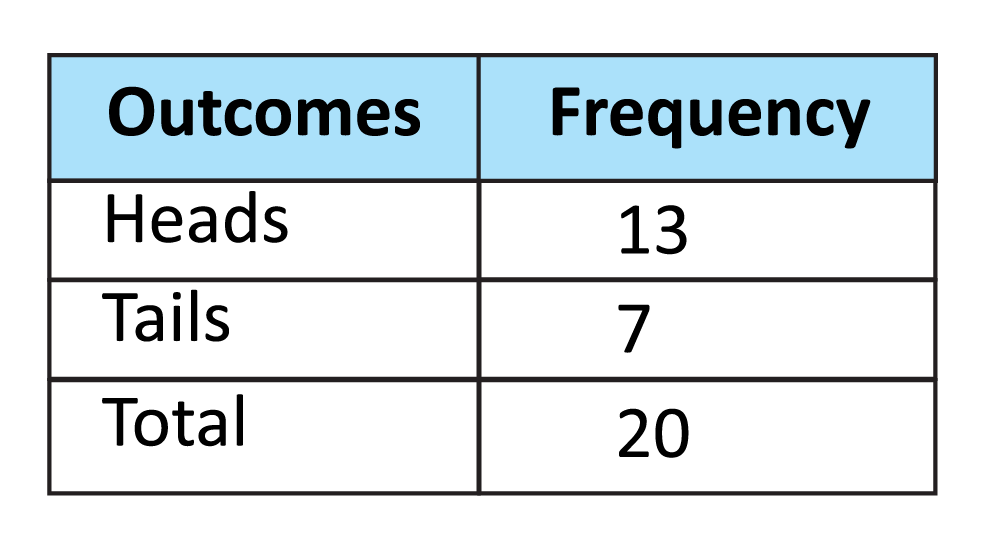a witch flips a coin. what are the chances that it's heads?
Based on the experiment, what was the probability of getting a tails?
7/20
is drawing a card that is simultaneously a red card and a club mutually exclusive?
yes
a trick or treater has just lost their costume in their room. if they have 3 drawers with equal amounts of clothing in each drawer, what is the probability of their costume being in the first drawer they look in?
1/3
A ghost rolls a fair die. What are the chances that it lands on a 2?
 Based on this experiment, what was the probability of getting heads?
Based on this experiment, what was the probability of getting heads?
13/20
the probability of flipping a coin and getting heads three times in a row
If three coins are tossed simultaneously, then the probability of getting at least two heads, is
1/2
a pumpkin, a squash, a Cucurbita maxima, and a gourd are having a tea party. They each brought a gift and laid them down on a table. They then pick up a random gift and open it. what are the chances of the gourd opening up its own gift?
what is "1/4"
 Based on the information shown, what is the probability of selecting an enlisted marine out of all marines?
Based on the information shown, what is the probability of selecting an enlisted marine out of all marines?
8928/9782
In an election, there are four candidates. Let the four candidates be A, B, C, and D. Based on the polling analysis, it is estimated that A has a 20 per cent chance of winning the election this time, while candidate B has a 40 per cent chance of winning the election. What is the probability that candidate A or B will win the election?
Solution) We notice that the events that {A wins election}, {B wins election}, {C wins election}, and {D wins election} are disjoint events since more than one of the events cannot occur at the same time. For example, if candidate A wins, then candidate B cannot win the elections. We know that the third axiom of probability states that,
If A and B are mutually exclusive outcomes, then P (A1 ∪ A2) = P (A1) + P (A2).
Therefore, Probability P (A wins election or B wins election) = P ({A wins the election} ∪ {B wins the election}) = P ({A wins election}) +P ({B wins election})
=P ({A wins election}) +P ({B wins election})
=(20/100)+(40/100)
=0.2+0.4
= 0.6
A card is drawn from the set of 52 cards. Find the probability of getting a queen card.
1/13
You are blindfolded and spun around ten times. You are asked to touch a rectangular candy corn with each of its colors taking up equal areas. What are the chances you touch the yellow section?
what is "1/3"
 based on the informational shown above, what are the chances of selecting a marine out of all the soldiers?
based on the informational shown above, what are the chances of selecting a marine out of all the soldiers?
9782/198420
2. Three coins are tossed up in the air, one at a time. What is the probability that two of them will land heads up and one will land tails up?
- 0
- 1/8
- 1/4
- 3/8
D
What is the probability that a number selected from the numbers (1, 2, 3,..........,15) is a multiple of 4?
1/5
there are 30 pieces of candy in a jar. If there are 6 pieces of snickers, twix, twizzlers, dum dums, and sour patch kids, what are the chances a trick-or-treater will get a snickers?
What is "1/5"
 Based on the information shown below, what is the probability of selecting an Army officer at random?
Based on the information shown below, what is the probability of selecting an Army officer at random?
10367/198420
8. An MP3 player is set to play songs at random from the fifteen songs it contains in memory. Any song can be played at any time, even if it is repeated. There are 5 songs by Band A, 3 songs by Band B, 2 by Band C, and 5 by Band D. If the player has just played two songs in a row by Band D, what is the probability that the next song will also be by Band D?
The probability of playing a song by a particular band is proportional to the number of songs by that band divided by the total number of songs, or 5/15=1/3 for B and D. The probability of playing any particular song is not affected by what has been played previously, since the choice is random and songs may be repeated.
100 cards are numbered from 1 to 100. Find the probability of getting a prime number.
1/4